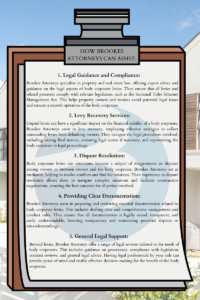Owning a property in a sectional title development in South Africa comes with the responsibility of contributing to body corporate levies. These levies play a vital role in maintaining and managing the common areas and shared facilities within the development. As a homeowner, it is crucial to have a clear understanding of body corporate levies and how they are determined. In this guide, we will explore the intricacies of these levies in South Africa, providing valuable information to help homeowners navigate this aspect of property ownership.
-
What are Body Corporate Levies?
Body corporate levies refer to the regular financial contributions made by homeowners in a sectional title scheme to cover the costs of managing and maintaining the common property. Common property includes areas such as hallways, gardens, swimming pools, parking lots, and security systems. Consequently, these levies are essential for the overall upkeep, administration, and improvement of the shared facilities within the development.
-
Determining Body Corporate Levies:
The calculation of the levies depends on several factors. The most common method used in South Africa is the participation quota (PQ) system. The PQ determines the proportionate share of each owner in the scheme relative to their unit’s size, location, and value. The levies are then allocated based on this percentage.
-
Types of Expenses Covered by Body Corporate Levies:
The levies are utilised to cover various expenses necessary for the proper functioning of the sectional title development.
These expenses can include, but are not limited to;
- General maintenance and repairs of common areas and facilities.
- Utilities such as water, electricity, and gas for shared spaces.
- Insurance premiums for the entire development, including the building structure and common property.
- Security services and systems.
- Cleaning and upkeep of communal areas.
- Administration and management fees.
- Reserve funds for future maintenance and capital expenditures.
-
Budgeting and Financial Management:
The body corporate is responsible for creating an annual budget, which outlines the estimated income and expenses for the upcoming year. Homeowners should receive a copy of this budget, including their individual levy contribution. It is essential to review the budget carefully and ensure transparency in financial management. Homeowners should participate actively in meetings and engage with the body corporate’s financial decisions.
-
Special Levies:
In some instances, the body corporate may levy additional charges known as special levies. These levies are imposed when unexpected or significant expenses arise, such as major repairs or renovations, that cannot be covered by the regular levies or reserve funds. Special levies are typically raised by the body corporate through a resolution and are distributed among homeowners based on their participation quotas.
-
Non-Payment and Legal Implications:
Failure to pay the levies can have legal consequences. The Sectional Titles Schemes Management Act of 2011 empowers the body corporate to take legal action against defaulting homeowners. It is crucial for homeowners to prioritise these payments to avoid potential penalties, interest charges, and legal disputes.

Feel free to Contact us with any questions or queries: info@gumedeandwarburton.com | Andrew Warburton | Michele Neveling






